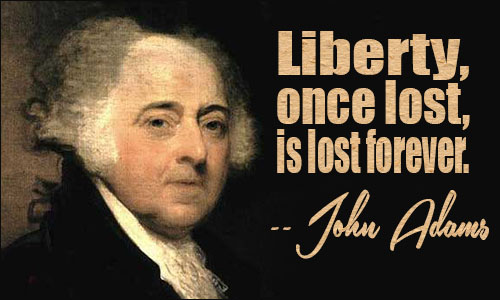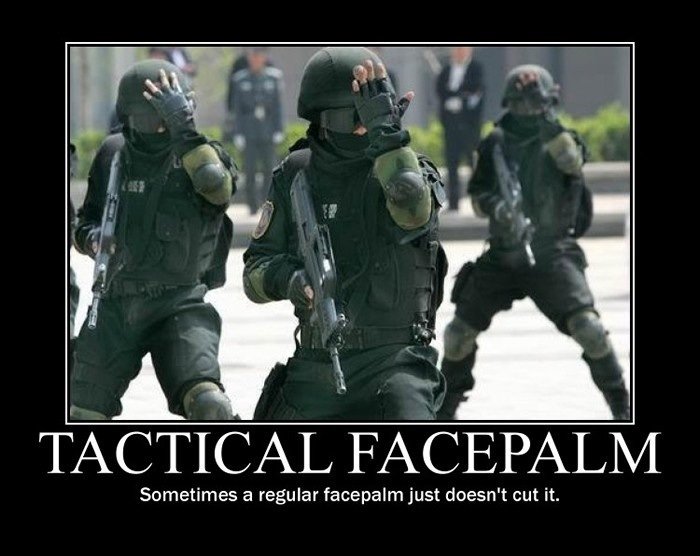"The charge of vanity is the last refuge of little wits and of mercenary
quacks! I have long learned, that a man may give offense, and he may
still succeed!"
A commenter on this blog brought up a valuable discussion and various criticisms of your not-so humble blogger, on my recent post discussing how the message of public service brings about disdain and insult from military officers. The essence of his criticism is that yours truly is not an effective communicator. He may very well be right. It's a criticism I have heard repeatedly over the years, and I have thought if there is one area where I could use some growth, it is in the art of persuasion and communication.
More specifically, my critic claims, "You lose your audience not with your argument but with your presentation" and "[i]rregardless, while I think you often have valid, sometimes even excellent points, you marginalize yourself with your methods of communication." He further states, "I encourage you to acknowledge that simply because you feel yourself to be right does not necessarily make others immoral or wrong.” He continues, "You owe it to your own stances to be more forgiving, more accepting, and more accommodating in your rebuttals. Acknowledging opposing viewpoints is strength not weakness. Argue, do not belittle. Accept, do not marginalize." He offers up, “Josh Billings, a famous 19th Century American writer, wrote that 'Silence is one of the hardest arguments to refute.'” He goes on to explain that, "Edward Gibbon (the author of The Decline and Fall of the Roman Empire), wrote that he 'never make[s] the mistake of arguing with people for whose opinion I have no respect.' Unless you wish to further marginalize yourself, either respectfully acknowledge or simply ignore the opinions of those people and those forums for whom you have little to no respect."
To sum up my critic's argument, he suggests that 1) an argument can be won or lost not on argument, but on presentation and 2) methods of communication can marginalize a person and therefore make their message ineffective, and 3) feeling you are right does not make others wrong, 4) a communicator should be forgiving, accepting, and accommodating in rebuttals, and 5) sometimes silence is the best response to opinions offered in public discourse.
The context of these criticisms comes from this blogger's assertion that military officers must faithfully and sincerely honor their oaths to support and defend the Constitution and bear true faith and allegiance to it, refuse unlawful orders should one be encountered, and put their nation's defense and the rights of their countrymen above their own career ambitions and personal comfort. Service before self. And the context stems from this blogger's judgments that those who treat their oath to the Constitution with disdain are not fit for military service, and those who think it appropriate to use machines of war against American citizens
are treasonous in their thought, if not their action. With this context in mind, I'll respond to the various criticisms while acknowledging the truth that my communication could be better.
Argument can be won or lost on presentation. To tackle this point, we would need an answer to the question, what is winning and losing? I won't presume to define this for my critic, but I will share that I don't think of argument as a matter of winning or losing. I wouldn't know how to gauge a victory or defeat in any case. I have seen many officers who say the right things, who in a discussion of officership would "agree" with me, and I have seen them betray those values when tested in the most grave manner. Words mean nothing. Action means everything. And until a person is tested, there is no measuring a win or loss. Character is the center of gravity. Words are often the armament of politicians and scoundrels, they cannot be trusted.
I don't attempt to mentor my peers in order to win or lose. Rather, I seek to be a cause in a complex and unknowable calculus of causes and effects, in hopes that a person who was raised with some semblance of character, will develop the courage to do right by their nation should they be tested. Based on my experience of the character of those in uniform, it seems a fool's errand, but the stakes are too high not to try. Beyond that,
the service has requested that I add my voice to the blogosphere, and so I do what I can, limited as my abilities may be.
I also realize that discussion is a team sport. It's not unlike my college days as an opener. Guys who were less confident than myself would go out with me, because I would brashly introduce myself to women in a cocky manner. Sometimes it worked, sometimes it didn't. When my communication style didn't work, another guy could quickly move in and apologize for his buddy. An opening was created. While that approach was not nearly as successful as mine, sometimes it worked. It was a team sport between guys who shared the same goal. It's the same in discourse as it was with that other kind of "course" - although "winning" is much less measurable.
Despite my limited communication abilities, I have seen them work. I have seen them have an effect on individuals and even groups. I have seen my inputs shape a message. I have seen positive effects from the causes I have offered the causal chain. Admittedly, not often.
But I'm no magician or great persuader, and my viewpoint and my communication style is simply one offered among others. Nothing prevents other officers from offering their more "effective" communication style, assuming they have the same goal to mentor frat boys in uniform to put away the beer bongs and turn off the football halftime show and develop into public servants. And two causal factors with the same goal are surely better than one. Especially on our very herd mentality peers. They may not have the character required, and one person promoting public service may be marginalized. But two voices? Half a squadron? A majority? Getting the herd to refrain from unlawful acts, even if merely out of social pressure, is still a success. So I invite those who are more effective in their communications to join the discussion. Sadly, I certainly don't see such voices at present. Perhaps there are some in lofty journals, but down here in the digital trenches, to say nothing of the hallways at work, the message of courageous public service seems to be extremely underrepresented. Fascist viewpoints, once reserved for the enemies we fought in battle, have instead become the fashion.
Methods of communication can marginalize a person and therefore make their message ineffective. This brings up, again, the fact that the herd mentality officers of Jonathan Dowty's characterization in his book on fighter pilot culture, and of my own experience of our service culture more broadly, do in fact act as a herd. A person is marginalized because his message is unpopular or challenges the status quo. It is the inevitable result of speaking truth to power, and while it may take a toll on the person, it doesn't damage his message. The message that all men are endowed by their Creator with certain unalienable rights is in no way sullied by the fact that Jefferson owned slaves. Adams' many professions on liberty are no less true, because he signed the Alien & Sedition Act and violated the Constitution as Jefferson pointed out to him. Both may have been hypocrites, but that doesn't change the truth, or falsity, of their particular messages. Those who are concerned with truth are able to distinguish between the message and the man uttering it. Those who are not able to distinguish, are not interested in truth and are therefore unreachable by any message of truth, though they can be pressured to act with social pressure as the herd animals they are.
Regardless of Jefferson and Adams, I have walked the walk, and not just talked the talk. I am a faithful public servant, and even those who do not like me and who not agree with me, will pronounce that to be the case. Weeks ago one airman criticized my communication style. But his criticism began by mentioning having the "utmost respect" for me, and stating that "I have spoken openly about my support
for what you did...and I have stated up and down the chain that it is the single most courageous action of any officer that I have ever worked with." He then proceeded to criticize my communication style. Another airman graduated top of his PME course, and gave a presentation about me as an example of moral courage while he was there. He described me as "
the only Airman [he] know[s] who has demonstrated the moral
courage and conviction to follow what [he] believe[s], even if it may come
at [his] own detriment." Yet we are not friends, and he criticizes my communication style. The reason is because I have standards for those who wear the uniform, and I'm not looking for popularity, and I don't play favorites in my criticisms. And I believe those in the profession of arms should be able to handle, and should expect, direct communication--not the soft sensitive new age communication offered on a pillow that so many in our ranks seem to think is appropriate these days. We are the most lethal force in human history, and we must set and enforce a high standard to include being able to handle direct feedback (gasp!). Agree or disagree with my communication style, but there is no doubt I have an impact and regardless of my words, my example and my fidelity as a public servant is unquestioned. Those who do not like me will say the same.
But those who would marginalize are not interested in the truth of words, or the righteousness of action. Franklin Spinney, friend of John Boyd, explained in his book, "The Plans Reality Mismatch" that in the DoD budget office, those who pointed out the faults of the weapons procurement process were "dismissed as a pessimist, critic, or obstructionist." Marginalization is not concerned with truth, it's concerned with power and status quo.
For my part, I'm unconcerned with being marginalized while attempting to mentor my peers to be prepared for the challenges of public service we are seeing today, and will most certainly face tomorrow. I'm not a politician who requires a nod from above, or support from the masses. I'm not attempting to build a following for financial or other gain. Being exceptional and having high standards prevents that as a possibility at any rate. I'm simply a public servant and I understand that public service means sacrifice. I adjust my communication style to my audience. I use this blog to comment in a civil fashion for civil discussions, and I use my M&M page when the discourse is less civil. My audience is known for lofty more academic discussions at times, and crude swagger-filled, machismo infested back and forth in other instances. I speak both languages, and I endeavor to be a part of the discussion on either level. While some may insinuate otherwise, there is no doubt that my voice is heard.
But as previously mentioned, I eagerly await the voices of my peers who are not marginalized, who are "effective" communicators, to publicly discuss the need of officers to be willing to lose their careers and convenience to support and defend the Constitution, and to refuse unlawful orders. Nothing would prove my critic's point like seeing that. But I don't see it as of present.
Feeling you are right does not make others wrong. This is a true statement. Likewise, feeling you are right does not mean others are not wrong.
A communicator should be forgiving, accepting, and accommodating in rebuttals. This is where I part ways completely with my critic. I do not believe certain viewpoints deserve forgiveness, acceptance, or accommodation.
The Saudi who believes he may beat his wife, the slave master who believes other human beings are his property, the Klansman who believes black Americans are not human and should be killed like dogs, the child molester who believes it is an act of love to violate defenseless children, and the military officer who believes it is okay to use the most powerful technology in human history against his countrymen in violation of their constitutional rights are all persons who do not deserve my forgiveness, acceptance, or accommodation. All those individuals, to include the military officer, are people who prey on the vulnerable and violate their rights.
The military officer does so after swearing an oath before God not to do so, and while being paid a tidy sum to make good on that oath.
No, I reject my critic's claim here utterly and completely.
Sometimes silence is the best response to opinions offered in public discourse. I am sure that is the view from those who disagree with a message, that silence is better. They don't wish to be challenged or exposed. They don't want to feel convicted for their failures and their treasonous characters. My critics can rest easy though, knowing that I am not a very effective communicator.
I appreciate the criticisms. It's a valuable discussion, and I recognize that my communication could be better. I tend to believe the impotence of my communication is better described by the words of Frederick Douglass, who said, "It is easier to build strong children than to repair broken men." I could, however, be wrong and regardless my communication can no doubt be improved. I therefore thank my critic, and I will endeavor to keep practicing until I get communication right.

















